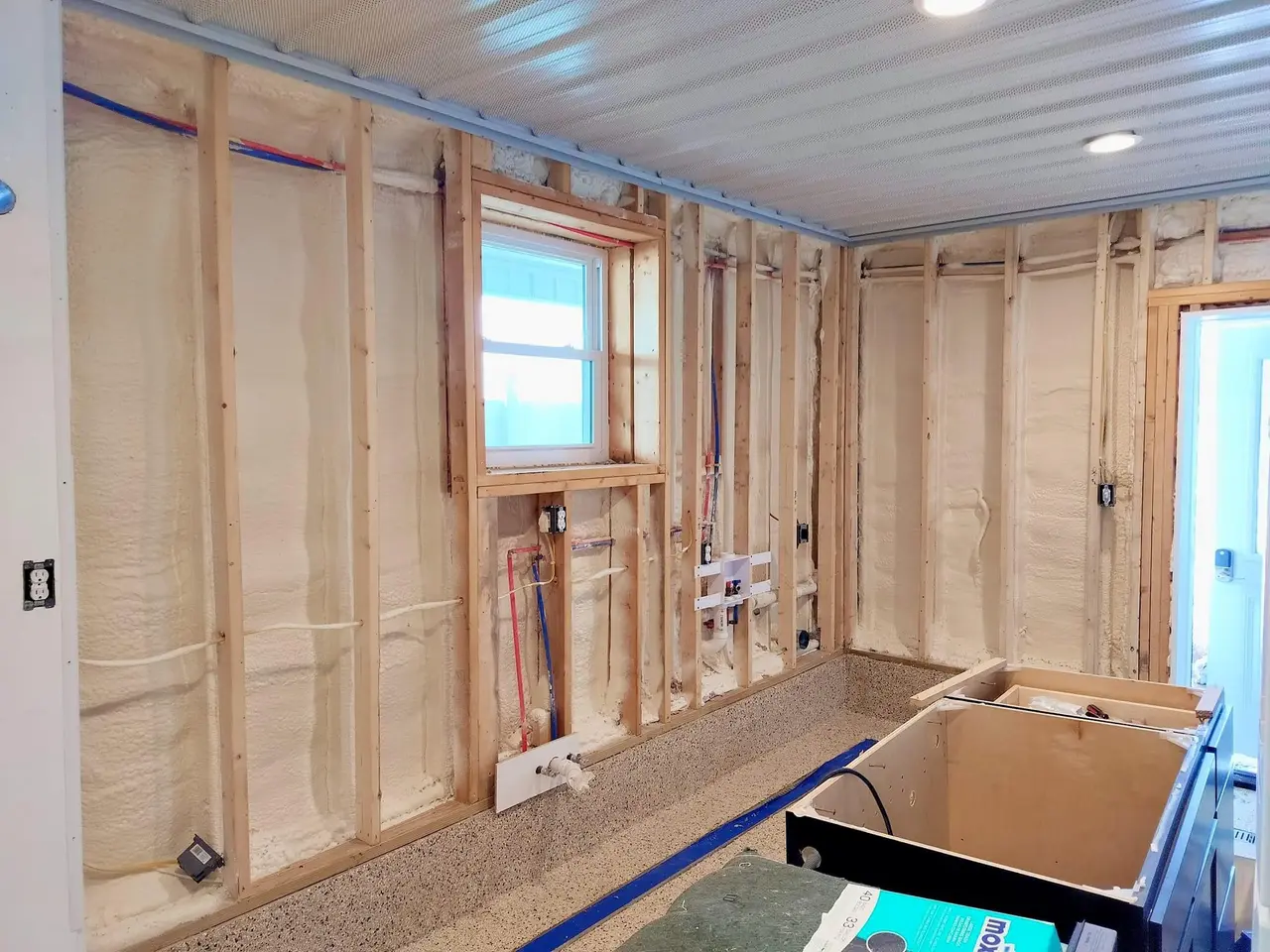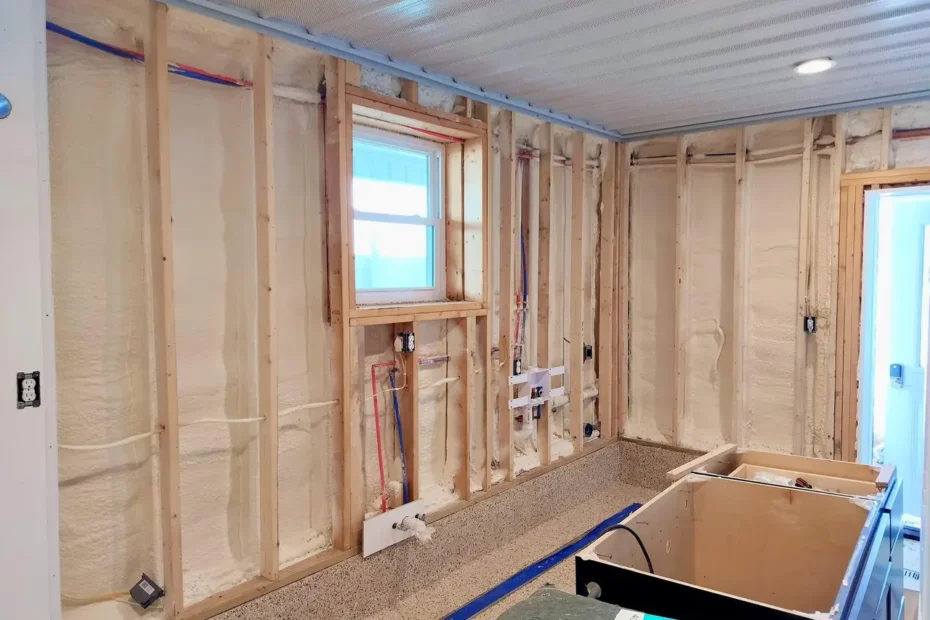Myth #1: Wall insulation makes homes stuffy
Many people think that having wall insulation in your home will make it feel stuffy. This is a common myth! Wall insulation actually helps regulate the temperature in your house, keeping it comfortable year-round. Insulation helps trap heat during the winter and keep your home cool during the summer. It ensures that your home is well-insulated and energy-efficient, making it a pleasant environment to live in.

Myth #2: Wall insulation is only for old houses
Some people believe that only old houses need wall insulation, but that’s a common misconception. Wall insulation is beneficial for all houses, regardless of age. Insulating your walls helps regulate the temperature inside your home, keeping it warm in the winter and cool in the summer. This can lead to lower energy bills and a more comfortable living environment. So, don’t be fooled by the myth that only old houses need wall insulation.
Myth #3: Wall insulation is a DIY job
Installing wall insulation is not usually a job that you should try to do yourself. Professional installation can ensure that the insulation is placed correctly and effectively, giving you the best results. A trained expert will know the right materials to use for your specific needs and can also address any potential issues that may arise during the process.
Myth #4: Wall insulation doesn’t save money
Many people believe that wall insulation doesn’t save money, but that’s actually a myth. Proper wall insulation can significantly reduce your energy bills by keeping your home warmer in the winter and cooler in the summer. By preventing heat transfer through your walls, insulation helps your heating and cooling systems work more efficiently, ultimately saving you money in the long run. Insulating your walls is a smart investment that can pay off through lower energy costs and a more comfortable living environment.
Myth #5: Wall insulation causes mold and dampness
Myth #5: Wall insulation does not cause mold and dampness. In fact, properly installed insulation helps regulate temperature and moisture levels within walls, reducing the risk of mold growth. Insulation materials like fiberglass, cellulose, and foam are designed to resist moisture and mold when installed correctly. Poor ventilation and existing water leaks are often the real culprits behind mold issues, not insulation. Insulating your walls can actually improve energy efficiency and create a more comfortable living environment.
Benefits of proper wall insulation
Proper wall insulation offers various advantages for your home. These include improved energy efficiency, which can help reduce your heating and cooling bills. Enhanced comfort is another benefit, as insulation helps maintain a consistent temperature inside your home. Additionally, wall insulation can reduce noise from outside, creating a quieter living environment. Moreover, insulation helps prevent moisture buildup, which can lead to mold and mildew issues. Lastly, proper wall insulation can increase the overall value of your home by making it more appealing to potential buyers.
Types of wall insulation materials
Many different materials are used for wall insulation, each with unique properties and benefits. Here are the common types:
- Fiberglass: Made of tiny glass fibers and is one of the most popular options.
- Cellulose: Made from recycled paper materials and is environmentally friendly.
- Foam Board or Rigid Foam: Offers high insulation value and can be used in various applications.
- Spray Foam: Provides an airtight seal and is excellent for hard-to-reach areas.
- Mineral Wool: Offers fire resistance and soundproofing qualities.
Cost considerations for wall insulation
Wall insulation can vary in cost depending on factors like the type of insulation material used, the size of the area needing insulation, and whether you hire a professional installer or do it yourself. Here’s a general idea of the cost considerations for wall insulation:
- Insulation Material: Different types of insulation materials have varying costs. Fiberglass insulation is usually cheaper compared to foam board or spray foam insulation.
- Area Size: The larger the area needing insulation, the higher the overall cost. It’s important to accurately measure the space to determine how much insulation material is needed.
- Professional vs. DIY: Hiring a professional installer can increase the initial cost but ensures proper installation. DIY insulation projects can save money but require time and effort.
Considering these factors will help you determine the total cost of insulating your walls effectively.
Professional installation vs. DIY
Hiring a professional for wall insulation installation ensures the job is done correctly, avoiding potential issues in the future. DIY insulation projects can be tempting to save money but can lead to mistakes like uneven insulation or inadequate coverage, which can reduce its effectiveness. Professional installation guarantees proper placement and insulation materials, maximizing energy efficiency and reducing future costs.
Debunking wall insulation myths: Facts to know
Not all wall insulation myths are true. Let’s clarify some facts for you. Proper insulation can reduce your energy bills and make your home more comfortable. Here are some important points to consider:
- Installation Cost: The initial cost of insulating your walls may seem high, but the long-term energy savings often make it a worthwhile investment.
- Mold and Mildew: Properly installed insulation can actually help prevent mold and mildew growth by regulating indoor humidity levels.
- Fire Safety: Contrary to some beliefs, many modern insulation materials are designed to be fire-resistant, enhancing the safety of your home.
- DIY vs. Professional Installation: While DIY installation can be tempting, it’s often best to hire a professional to ensure proper installation and maximum energy efficiency.
- Types of Insulation: There are various types of insulation available, each with its own pros and cons. Researching and choosing the right type for your home is essential for optimal results.
